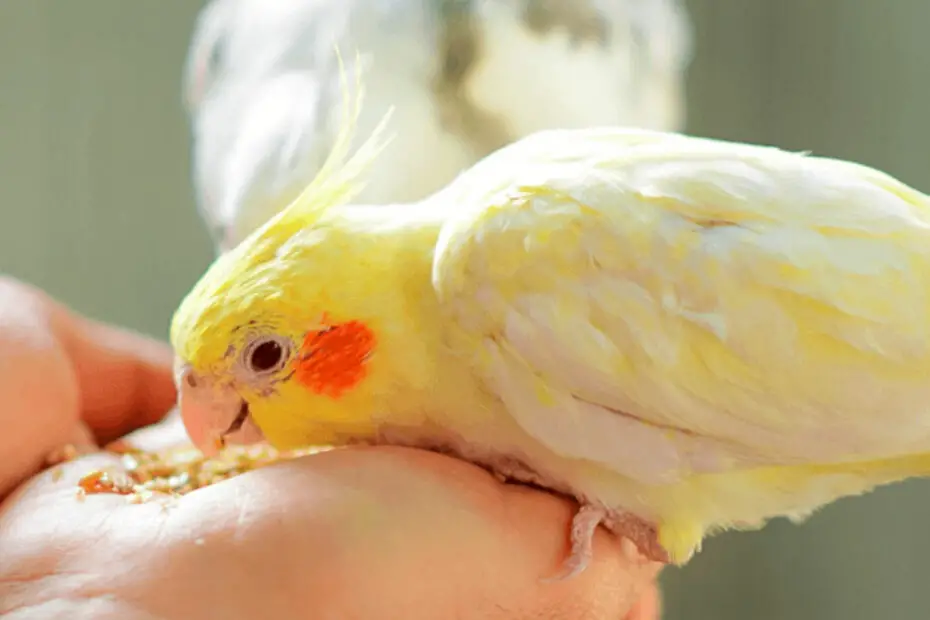The cockatiel is a small parrot species that are native to Australia. With their distinctive orange cheeks, playful personality, and melodious chirps, they have captured the hearts of bird lovers across the globe. If you are the happy owner of a cockatiel, you are aware of how crucial it is to maintain their overall well-being. However, considering the abundance of foods and feeding options available, it may be challenging to choose what, when, and how to feed your bird.
Your pet bird will need a balanced diet of seeds, pellets, fruits, and vegetables, according to a cockatiel feeding routine. You must feed your cockatiel twice a day, in the morning and the evening. The amount of food depends on the age, size, quality of the food and level of activity of the bird. Additionally, it’s essential to clean your bird’s food and water bowls every day and to always supply fresh water.
Understanding your bird’s health and nutritional requirements is crucial for avoiding common problems like obesity and malnourishment. Additionally, a regular feeding regimen helps lengthen your cockatiel’s life! An excellent cockatiel diet plan will not only keep your bird happy and healthy, but it will also help you and your pet develop a great bonding.
In this article, we will go over everything you need to know about feeding your bird to ensure they get all the nutrients they require, including what to feed them, when to feed them, and how to do it. So let’s start now!
What Are The Different Types Of Food You Can Feed Your Cockatiel?
Cockatiels require a balanced diet and proper feeding schedule to maintain their lively nature and good health. To let you know more about bird food types and nutritional values, we have provided a table below that lists the different types of food that provides suitable bird nutrition for your beloved cockatiel.
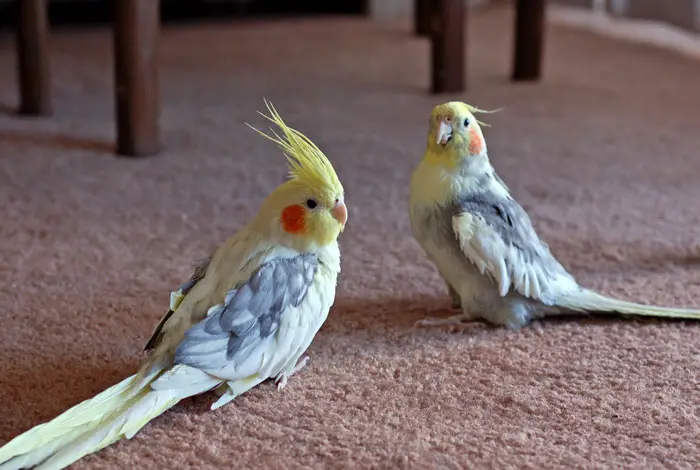
| Type Of Food | Examples | Nutritional Value |
|---|---|---|
| Nuts | Almonds, Walnuts, and Unsweetened peanut butter | Nuts are a good source of healthy fats, protein, and vitamins |
| Cooked grains and legumes | Brown rice, garbanzo beans, quinoa, and lentils | They are a good source of protein and fiber |
| Seeds | Black sunflower seeds, Flax seeds, Safflower, French white millet, and Thistle | They include a lot of protein, fat, and carbs. Some seeds, such as sunflower seeds, are also rich in calcium, vitamin E, and vitamin A |
| Insects | Insects that are alive or dried, such as caterpillars, flies, and crickets | It is well known that insects are a great source of protein, vitamins, and healthy fats |
| Fresh fruits and vegetables | Broccoli, corn, green lettuce, peas, lemons, carrots, kale, apple, pear, and berries | They provide vitamins, antioxidants, minerals, and fiber to your bird |
| Pellets | 25% of the diet of your cockatiel should consist of pellets. Pellets are foods that have been crushed and extracted from a range of components, including grains, vegetables, and fruits | Pellets contain high amounts of protein and fat. It also has phosphorus, fiber, Vitamin D3, and Vitamin A |
Understanding Bird Diet: Role of Macronutrients And Micronutrients In The Diet Of Cockatiels
A balanced meal that contains proper bird nutrition is the first step in keeping your cockatiel healthy and content. This consists of a combination of micronutrients like vitamins and minerals and macronutrients like carbohydrates, lipids, and proteins.
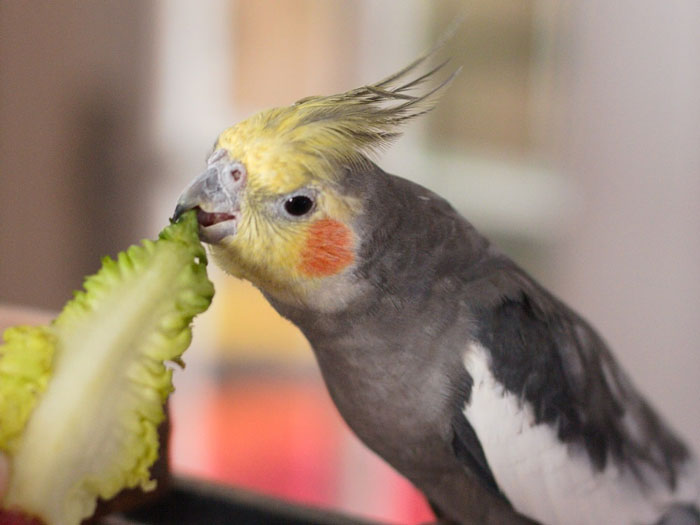
To maintain your cockatiel’s best health, make sure its diet is high in carbs, low in fat, and moderate in protein. As a general guideline, strive for a diet that contains 50%–70% carbohydrates, 10%–15% fat, and 15%–20% protein.
Additionally, you must ensure that your cockatiel is receiving all the required micronutrients, such as vitamins and minerals. For instance, calcium is necessary for the creation of eggshells and strong bones, while vitamin A is critical for keeping healthy skin, feathers, and eyesight. Other important micronutrients include vitamin D, vitamin E, iron, and zinc.
The following table can help you understand roughly how much of each nutrient your cockatiel needs in its diet:
| Macronutrients | |||
| Nutrients | Amount per day | Function | |
| Fats | 1-2g | Provides energy and supports the immune system of the bird | |
| Carbohydrate | 10-14g | Provides energy to your cockatiel | |
| Protein | 2-3g | Helps to build and repair muscle tissue | |
| Micronutrients | |||
| Nutrients | Amount per day | Function | |
| Calcium | 0.3-0.5g | It supports bone formation, and nerve and brain functions | |
| Iron | 0.4-1.0mg | Helps to transport oxygen around the body | |
| Phosphorous | 0.6-0.8mg | Phosphorus is crucial for the production of nucleic acids, as well as for energy metabolism, muscular function, enzyme activity, and lipid metabolism | |
| Zinc | 3.0-6.0mg | It supports the immune system and skin health of cockatiel birds | |
| Vitamin A | 300-500 IU | Improves the eyesight of the bird | |
| Vitamin E | 5-10 IU | Boosts the immune system and ensures good health | |
| Vitamin D3 | 50-80 IU | Improves bone health | |
What factors should you consider when selecting a diet for your pet bird?
When it comes to the health and well-being of your beloved pet cockatiel, their diet plays a crucial role. To ensure that your pet cockatiel stays healthy, consider the following factors when selecting their diet:
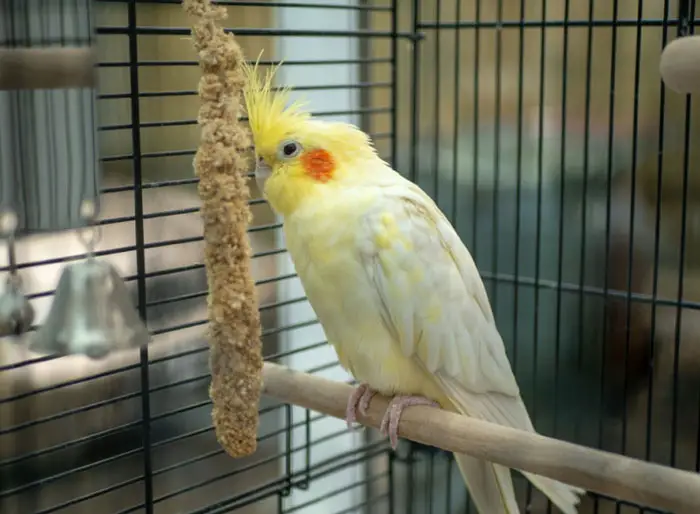
Health condition of your cockatiel
You may need to choose a particular diet to satisfy your bird’s needs if they have any health conditions or dietary requirements, like allergies, obesity, malnutrition, and bird digestion disorders. In a study, it was discovered that feeding cockatiels a diet made up of 80% pellets and 10%–15% fresh fruits and vegetables resulted in appropriate nourishment for adult birds.
Level of activity
A bird that is more active might need more calories to maintain its energy levels, whilst a bird that is less active might need less.
Food preference of your pet
Just like us humans, birds can have their own food preferences too. It is important to find food that your cockatiel will actually enjoy eating to ensure they get the necessary nutrition. A study claims that the cockatiel prefers soft, immature seeds over harder, older seeds.
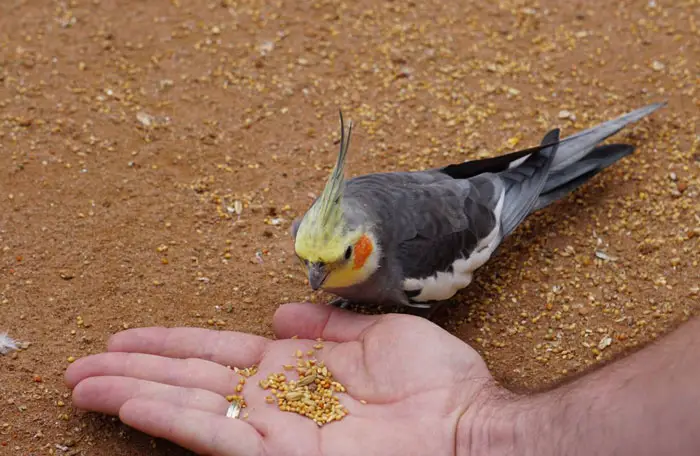
Dietary requirement
Cockatiels require nutritious food that is balanced and contains carbs, proteins, fats, vitamins, and minerals. So you ought to select food that satisfies their dietary requirements.
The Age of Cockatiel
Your cockatiel’s nutritional needs will change as it gets older. Adult birds require less protein than young birds do.
Quality of the food
High-quality, fresh food is essential to ensure that your cockatiel receives the best possible nutrition.
You can take other steps in addition to feeding your cockatiel a balanced diet to keep them healthy and content. They also must have access to socialization and environmental enrichment for their well-being. For instance, providing your cockatiel with a variety of toys and bird accessories will keep them busy and active while allowing them to explore their environment.
It’s also important to interact with your bird, spend time with them, and provide them with play and exercise opportunities. With a little effort, you can ensure that your cockatiel is well-fed, mentally stimulated, and socially fulfilled.
Tips On Creating A Feeding Regimen That Is Suitable For Your Pet Cockatiel?
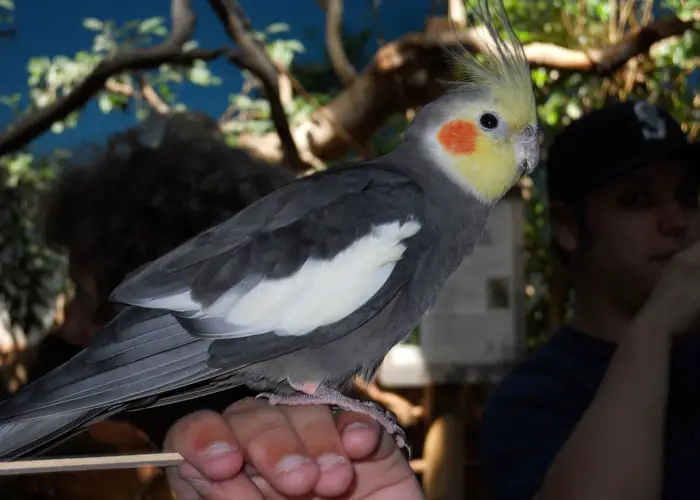
Your cockatiel’s well-being and longevity depend on you setting up a proper feeding routine for it. I have provided you with some basic Cockatiel feeding tips to help you create a feeding plan.
- It is important to establish a good feeding routine for your pet cockatiel. The majority of cockatiels consume two little meals every day, one in the morning and one in the evening. You should choose a timetable that works best for you and your bird. This can help you in ensuring effective bird health management.
- Your cockatiel should have access to clean water at all times. It is recommended to change the water at least once a day and clean the bowl thoroughly to prevent bacterial growth. To make it simpler for your pet to consume water, use a clean and fresh water dish or bottle.
- You should feed your pet bird treats like seeds, nuts, and dried fruits from time to time, even if they might appear to appreciate them. They shouldn’t make up more than 5% of your cockatiel’s daily diet.
- Make sure your cockatiel’s diet includes high-quality pellets, which should be the main component of their diet. Keep the pellets in a separate dish and make sure it is always full.
- Fresh fruits and vegetables should also be included in your cockatiel’s daily diet. Try to offer a variety of colorful options like carrots, spinach, broccoli, and apples.
- It is advised to feed your cockatiel consistently throughout the day. This encourages the bird to have a healthy appetite and keep up a consistent eating schedule. It’s crucial to watch your bird’s food intake and modify the portion size as necessary because overfeeding can cause obesity and other health problems.
- It’s crucial to choose a feeding bowl that is the proper size for your bird. The bowl shouldn’t be so large that it makes a mess, but it should be sufficiently wide so that your bird can easily access the food. Avoid using plastic bowls and keep your bird cages and the food bowls sanitized.
How Do Different Factors Affect The Feeding Schedule Of Cockatiel?
A cockatiel’s feeding schedule can be impacted by several variables. Some of the most significant ones are listed below:
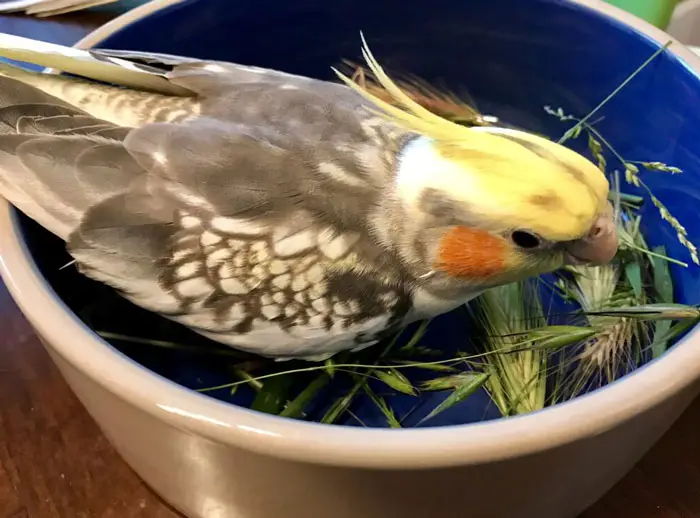
Age
To support their growth and development, young birds need to be fed more frequently. Older birds, however, may require less food overall due to changes in their metabolism and digestive system. You will find a table below with general recommendations for feeding cockatiels based on their age:
| Age of Cockatiel | 0-6 Weeks | 6-12 Weeks | 12 Weeks-1 Year | Above 1 Year |
| Recommended feedings per day | 5-7 | 4-5 | 2-3 | 2 |
Health Condition
The health of a cockatiel can also affect how often it eats. Smaller, more frequent meals may be necessary for sick or injured birds to maintain their health and energy levels.
Weight of Cockatiel
The amount of food cockatiels consumes can also vary depending on their weight. It may be necessary to change the feeding plan for overweight or obese birds to aid in weight loss. To make the bird feel fuller and consume less food overall, this may entail reducing the amount of food supplied at each meal or increasing the frequency of feedings.
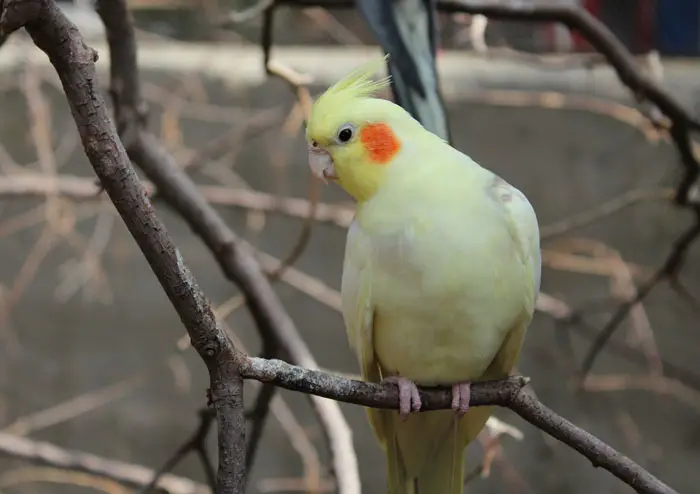
Diet of Cockatiel
A food rich in protein and fat will make the bird feel fuller and more satisfied, lowering the number of times it needs to be fed. Contrarily, a diet rich in fiber and carbs may call for more frequent feedings to guarantee the bird is getting enough energy.
Activity Level
A cockatiel with plenty of room to fly and play will burn more calories and need more food than a bird that spends most of its time in a cage.
What Are The Common Nutritional Problems That Can Affect Cockatiels?
Cockatiels are intriguing birds with particular dietary needs. Putting off their nutritional requirements can result in a variety of health problems. Thus, your main priority should be addressing nutrition issues in pet birds. The top five dietary issues that can affect cockatiels are listed below, along with advice on how to prevent them.
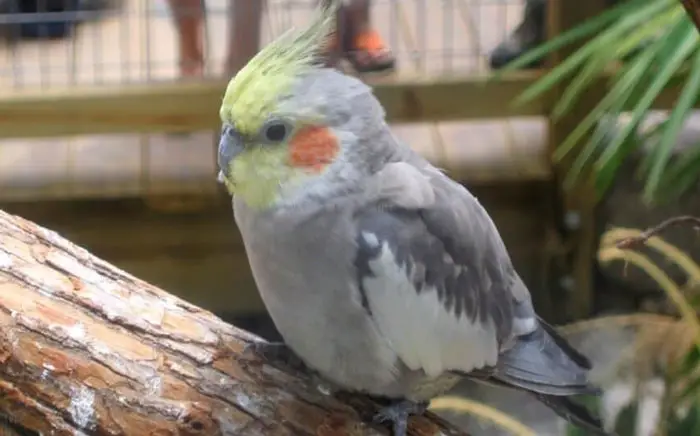
- Iron storage disease: A cockatiel’s diet high in iron can develop iron storage disease, which can cause liver damage and possibly death. To prevent this, limit the amount of iron-rich foods you feed your bird, such as red meat and dark leafy greens. A study suggests that diet changes, targeted iron chelation therapy, and phlebotomy can all be used to treat iron storage disorder in birds.
- Lack of protein: Cockatiels need protein for growth and development. Without it, they may develop slowly, develop low-quality feathers, and have weaker immune systems. You should offer cooked eggs, tofu, legumes, and premium pellet mixes to your bird to ensure that it receives enough protein.
- Obesity: Cockatiels love to eat and can easily become overweight if they are overfed or don’t get enough exercise. Obesity can lead to a range of health problems, including fatty liver disease. To keep your cockatiel healthy, provide them with a balanced diet and plenty of opportunities for physical activity.
- Lack of calcium: In female cockatiels, calcium is essential for the development of strong bones and a good eggshell. Lack of calcium can cause egg binding and brittle bones, both of which can be lethal. Give your bird calcium-rich foods like low-fat cheese, broccoli, and almonds to avoid this.
- Vitamin A deficiency: A lack of vitamin A can cause a range of health problems in cockatiels, including respiratory infections, skin disorders, and even blindness! A study suggests that providing 4000 IU VA/kg of diet can help prevent vitamin A insufficiency in cockatiels. So, give them vitamin A-rich foods like sweet potatoes, carrots, and lots of leafy greens like kale and spinach.
- High glucose level– Hyperglycemia is a condition that cockatiel birds may encounter when their blood sugar levels are elevated. Hyperglycemia in birds can cause symptoms such as increased thirst, increased urination, weight loss, lethargy, and decreased activity levels. If untreated, hyperglycemia in cockatiel birds can eventually result in more serious health issues such organ and nerve damage as well as death.
How To Handle Typical Feeding-Related Concerns With Cockatiels?
Feeding is a crucial part of taking care of your pet cockatiel. And taking care of feeding-related issues is crucial for preserving bird health and maintaining stable bird behavior. The following are some typical cockatiels feeding issues that must be addressed.
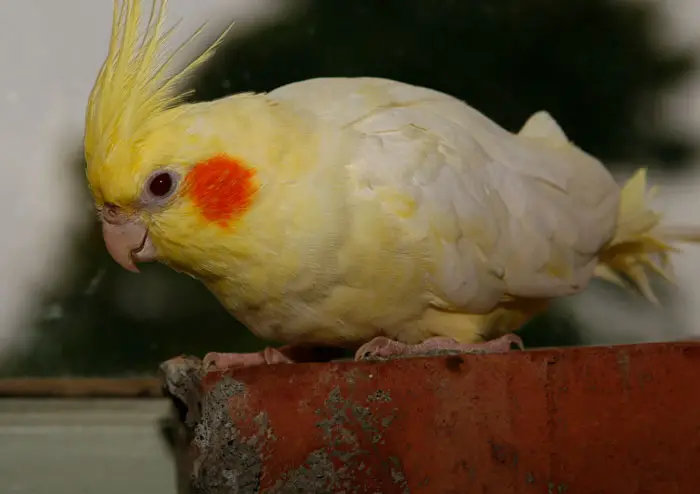
- It can be worrying and distressing for both you and your bird if your cockatiel exhibits food aggression. However, there are techniques to deal with this tendency and establish a more tranquil feeding schedule. You could experiment with altering your bird’s food schedule.
Offer them little meals all day, rather than at the same time every day. This may lessen their anxiety and keep them from feeling like they have to fight to get food.
- Another annoying trait that cockatiel owners may have to cope with is water aggressiveness. This issue can be resolved by placing a water bowl on the cage’s floor and another one higher up so that your bird can reach the water without feeling the need to guard a single source. Additionally, this may motivate your bird to drink water frequently during the day.
- If your bird is a picky eater, you can mix a portion of the new food with familiar food to make it more appealing to your bird. In doing so, you may be able to help the bird become used to the flavor and consistency of the new food.
Another way to encourage your bird to try new meals is to provide them at different times of the day, such as in the morning or evening when they are most ravenous.
- Your cockatiel may get obese and have other health problems if you overfeed it. Reduce your bird’s feeding intake and provide more opportunities for exercise if you see that it is gaining weight. Instead of high-fat treats like seeds, provide nutritious treats like fresh fruit and vegetables.
FAQs
For more details on the cockatiel bird’s feeding schedule, read the FAQs below.
Yes, it is possible to teach cockatiels to find their food, and doing so has several advantages. Giving birds a chance to forage, which is a natural behavior for birds in the wild, can lessen boredom, promote mental and physical stimulation, and enhance general well-being.
If you want to teach foraging to your cockatiel, start by hiding little amounts of food around their cage or living area and letting them search for it.
You can feed your pet cockatiel human foods like bananas, berries, melons, oranges, peaches, broccoli, carrots, corn, peas, peppers, spinach, brown rice, quinoa, and eggs. But you must watch out that they don’t consume foods like avocado, chocolate, coffee, tea, and butter.
Lack of food might cause your cockatiel to become lethargic, lose weight, or become less active. To make sure they are eating enough, keep track of their weight and see how much food they are consuming each day. Additionally, you should see a vet right away if you detect a sudden decrease in their appetite.
Cockatiels belong to the Nymphicus genus and are a single species called Nymphicus hollandicus. However, they have numerous diverse color mutations and pattern variations that result in distinctive breeds. The Lutino, Pearl, Cinnamon, Whiteface, and Normal Grey Cockatiels are a few of the recognized variants of Cockatiel birds.
Final Words
In conclusion, caring for a pet entails a lot of work, so it is critical to provide your cockatiel with the greatest care available. Making sure your cockatiel has a balanced and healthy diet is one of the most important aspects of pet care. A balanced and healthy diet that provides nutrient balance is key to keeping your pet cockatiel in good physical condition.
You should give your pet fresh fruits, veggies, premium pellets, or a random treat to prevent future health problems including malnutrition, dehydration, obesity, and illnesses. Furthermore, to maintain your pet cockatiel’s mental health, you can try to apply a variety of environment enrichment techniques.
It is crucial to keep in mind that cockatiels’ dietary requirements vary based on their size, age, and amount of activity. Therefore, consulting with an avian nutritionist can help you design the ideal feeding schedule and diet plan for your cockatiel. Check out resources like avian veterinarians, research papers, google threads, internet forums, and textbooks. on bird care if you’re curious to learn more about cockatiel species and breeds, cockatiel diet, and bird health.
